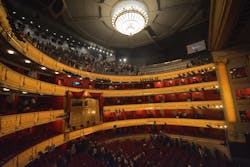Venerable Spanish theaters deploy UV-C to disinfect coronavirus
Madrid-based stage and entertainment lighting company Stonex has outfitted two 19th century Spanish theaters with glass tube ultraviolet UV emitters from Chinese producer Goldensea UV, with the aim of disinfecting the novel coronavirus during unoccupied times.
Stonex is supplying Goldensea equipment of different shapes and sizes for use in stage, seating, and rehearsal areas to Madrid’s Teatro Real opera house and Toledo’s Teatro Rojas performance venue.
The equipment includes quartz glass lamps that emit UV-C, the short wavelength band of ultraviolet radiation that has been proven both in conventional glass tube form and in LED form to kill SARS-CoV-2, the coronavirus behind COVID-19. The UV-C band ranges from 100 to 280 nm.
Goldensea is also known as Guangzhou Haoyang Electronic Co., Ltd. The Guangzhou City-based company makes a range of glass tube UV-C products for both industrial and and residential markets, emitting at 253.7 nm, according to its website. It appears to use mercury vapor technology, although Stonex did not say so in two separate announcements about the theaters’ deployments. Stonex had not replied to a LEDs Magazine query by the time this story posted.
Madrid’s 170-year-old Teatro Real reopened on July 1, following a pandemic-related shutdown. It has been staging limited-capacity shows, enforcing social distancing of performers as well as of audience members. It has also implemented other health precautions including face masks, hand gels, and perspex screens.
Now it has added UV-C to the mix.
The theater is using two of Goldensea’s tall, rectangular units, called the UVM 216 (the “M” stands for “mobile) that it wheels across the stage and rehearsal areas. It has also mounted four fixtures that Goldensea calls the UVL 150 above the stage area. Goldensea says both units are for surface disinfection.
Toledo’s 142-year-old Teatro Rojas has mounted two UVL 150s along the sides of the seating areas, is using a mobile UVM 216 for the stage, and has also opted for two tabletop units that Goldensea calls the UVP36 for backstage use.
Although UV-C can be an effective agent against the coronavirus, it has its own serious health issues in that it is harmful to skin and eyes when people come in direct contact with it.
That’s why the theaters are using the products only when people are not present. Stonex said the Goldensea products’ safety features include “delayed start, allowing evacuation of the area to be disinfected; remote control; motion sensor that makes the device turn off when it detects movement of a person or animal; drop sensor in those that are mobile; light indications in red or green, as well as beeping to warn the user.”
Thus the deployments will not provide continuous real-time disinfection during performances. Rather, the theaters’ surface-oriented UV-C lamps will serve as giant wipes to be used repeatedly.
Lighting vendors such as Signify have talked about the possibility of mounting UV-C ceiling lamps pointed upwards to disinfect air in occupied rooms with active air circulation. GE Current has introduced a UV-C LED puck with similar intentions.
Goldensea itself makes an enclosed floor-standing version of its 216, called the UVAIR 216, for the home market.
MARK HALPER is a contributing editor for LEDs Magazine, and an energy, technology, and business journalist ([email protected]).
For up-to-the-minute LED and SSL updates, why not follow us on Twitter? You’ll find curated content and commentary, as well as information on industry events, webcasts, and surveys on our LinkedIn Company Page and our Facebook page.

Mark Halper | Contributing Editor, LEDs Magazine, and Business/Energy/Technology Journalist
Mark Halper is a freelance business, technology, and science journalist who covers everything from media moguls to subatomic particles. Halper has written from locations around the world for TIME Magazine, Fortune, Forbes, the New York Times, the Financial Times, the Guardian, CBS, Wired, and many others. A US citizen living in Britain, he cut his journalism teeth cutting and pasting copy for an English-language daily newspaper in Mexico City. Halper has a BA in history from Cornell University.




![The DesignLights Consortium continues to make progress in shifting outdoor lighting products and implementation practices toward a more restrained and thoughtful strategy. [Image does not represent a DLC qualified fixture.] The DesignLights Consortium continues to make progress in shifting outdoor lighting products and implementation practices toward a more restrained and thoughtful strategy. [Image does not represent a DLC qualified fixture.]](https://img.ledsmagazine.com/files/base/ebm/leds/image/2024/08/66be810888ae93f656446f61-dreamstime_m_265700653.png?auto=format,compress&fit=&q=45&h=139&height=139&w=250&width=250)
